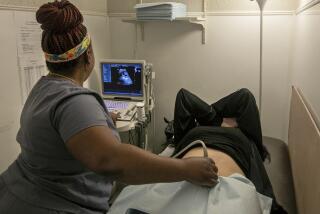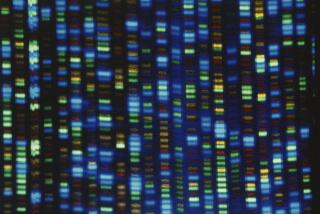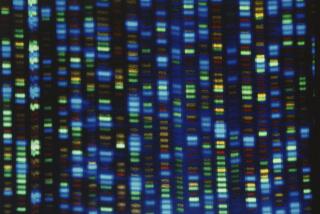Genetic testing doesn’t spook patients, study finds
When Mike Godfrey’s employer put out a call for recruits for a study on genetic testing, he hesitated before volunteering to hand over a swab of his saliva.
The communications executive at Scripps Health in La Jolla wasn’t completely sure he wanted to know what the test would reveal about diseases he might get down the road.
Thinking twice made sense. Ever since the 2007 introduction of direct-to-consumer genome-wide tests — which scan a person’s DNA and report on the genetic risk of developing 20 to 40 common diseases — experts have wondered whether telling regular folks they’re more likely to develop illnesses such as diabetes, heart disease or cancer would trigger extreme anxiety, or would result in increased use of unnecessary and expensive medical tests.
Apparently it does not, the Scripps study found.
It also does not seem to push people to make significant lifestyle changes — such as cutting back on burgers and fries or picking up an exercise class.
“People handled [getting their test results] very well. We don’t give consumers enough credit for what they can process,” said Dr. Eric J. Topol, chief academic officer of Scripps Health and a member of the research team. But, he added, “the lack of lifestyle improvements was disappointing.”
The findings came as something of a surprise. Through years of handwringing over the promise and pitfalls of genomic testing, the possibility that men and women would learn what lurked in their genes, shrug and go back to business as usual was never the primary concern. Rather, some physicians and policymakers worried that patients would purchase faulty or incomplete data; misunderstand the data; become depressed by or overreact to what they learned; be snookered by dishonest companies pushing unproven cures; or sacrifice their privacy if their genetic information was compromised or sold.
Such concerns persist. Groups such as the Genetics and Public Policy Center at Johns Hopkins University have called for increased regulation of the industry. In July, the Government Accountability Office reported from its recent investigation of a variety of direct-to-consumer genetic tests that consumers received results that were “misleading and of little or no practical use.” The Food and Drug Administration announced last year that it would tighten oversight.
Others, including National Institutes of Health director Francis S. Collins and executives at companies like Navigenics, the maker of the tests used in the Scripps study, suggested that putting genetic information directly into patients’ hands might be empowering, and could promote better habits and compliance with doctors’ orders.
Collins told an audience at a 2009 conference on personalized medicine that though he had been a skeptic, his own experiences taking genome tests — which revealed that he had an elevated risk of diabetes — had encouraged him to begin an exercise program. “There is something about this information that does get your attention,” he said.
The Scripps survey, which was published Wednesday in the New England Journal of Medicine, was the first to assess how genome-wide tests affect consumer behavior. Researchers recruited 3,639 subjects — including Godfrey and his parents — from San Diego-area health and technology companies. The enrollees purchased the Navigenics Health Compass, a direct-to-consumer genome test, at a discounted rate, and provided saliva samples at a local collection center.
They filled out an online survey to establish their baseline anxiety and health behaviors, then received their test results. They took another Web survey five months later, reporting their levels of anxiety and distress; what new health screenings they were planning to get or had received; and what lifestyle changes, if any, they planned to make or had made.
Both surveys were completed by 2,037 subjects. More than 90% demonstrated no test-related distress, the study reported.
People who had higher risk for disease said they would get a greater number of screenings in the future to monitor their health. But the researchers saw no significant differences in the level of anxiety, dietary fat intake, or exercise between the baseline and follow-up groups overall, they wrote.
In Godfrey’s case, he learned that he was at high risk for macular degeneration, which can cause blindness. “The next time I go in for my eye exam, I’m certain to say, ‘I want this test,’ ” he said of the screening for the eye disease. He also learned he’s at risk for celiac disease, which causes damage to the small intestine. Though he doesn’t plan to do anything for himself, he took his daughter — who has stomach troubles — to be tested.
Michelle Fox, a genetic counselor at UCLA, said direct-to-consumer genome tests don’t offer a whole lot, so it’s no wonder people don’t get very anxious about them. “This is the future. But it’s not a here-and-now,” she said.
And Colleen McBride, a researcher at the National Human Genome Research Institute, said the findings were an important “first step” in asking questions about a growing field of which very little is known.
But she said the results would have been stronger if the subjects hadn’t been self-selected (they were relatively highly educated, wealthy and motivated compared with the general population) and if the researchers had taken rigorous measurements of the behaviors subjects reported (hooking patients up to accelerometers, charting their weight and body mass index, conducting dietary assessments, studying health records) instead of depending on survey responses.
Topol said the study results should assuage fears about genetic testing. “We’ve shown that at least those people who are curious are not hurt, and they may benefit from the results,” he said.
He agreed that the test subjects were not representative of the general population, but added that they were the kind of people who purchase direct-to-consumer tests today. “Where,” he said, “do you start?”
More to Read
Sign up for our L.A. Times Plants newsletter
At the start of each month, get a roundup of upcoming plant-related activities and events in Southern California, along with links to tips and articles you may have missed.
You may occasionally receive promotional content from the Los Angeles Times.







